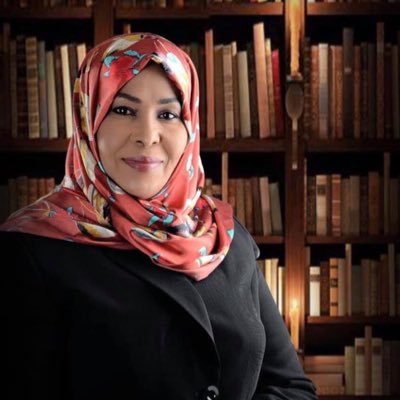Poet Rawda Al-Hajj in exceptional revelation: I Feel Sad .. sad..!

* There is a cultural earthquake coincided with the firing of the first bullet in the war.
* The ongoing confusions will lead to a change in psychological, behavioral and emotional structure of people
* There will be great poetic epics that tell what happened with a clear tongue..!
Sudan Events: Magda Hassan
Poet Rawda Al-Hajj revealed her deep feeling of sadness. She said in an interview to “Sudan Events” that she is very sad these days, when the country and its citizens are exposed to great trials.
But why is she sad, exactly?
She answers, in a tone dripping with tears: I am sad, because we will understand a lot in the most difficult way possible, and we could have understood it in an easier way. Sad because our definition of “strangers” will change, because our spontaneity will be killed, and because our view of “the other” will suffer great devastation. She goes on to reveal more, as she deconstructs the reasons for her sadness.
She stands with her penetrating insight at the great transformation that the war has brought about, as she says, since the shot of its bullet. The first. Says :-
There was a great cultural earthquake that occurred simultaneously with the firing of the first bullet.
The state of astonishment mixed with fear and confusion, the cases of forced departure and mass displacement, the cases of gratuitous death, theft and looting, the unpleasant surprises that were waiting for everyone, the rapid transformation from being a mosque imam, a tea seller, or a guard.
Amara, from a person to whom you used to say hello in the morning and he returned it with the utmost cordiality, to a murderer, an informant, and an occupier.
All these great confusions will lead to a great change in the psychological, emotional, behavioral, and therefore cultural, structure of every individual who lives the facts of what happened.
Despite all these momentous events and the dangerous consequences that result from them, at the level of individuals and societies, and what indicates a change affecting the Sudan that we have known and become accustomed to, the Princess of Poets says that she will not stop creating:
I cannot stop writing for Sudan and about Sudan.
Sudan, the land, the people, life, the deserts, the Nile, the beloved dialect, the faces I love, the brown laughs, and the domestic homes, the Sudan that inhabits me from the top of my head to the soles of my feet, the Sudan of love that has not and will never leave me as long as I live.
She concludes her speech, with what she expects to be a reflection of the current dramatic developments at the level of creativity, by saying:
Literature in all its forms will take time to absorb what happened and reproduce it, according to a different angle of view, and I expect the emergence of great poetic epics and the birth of international novels that will tell what happened in a clear Sudanese language.



